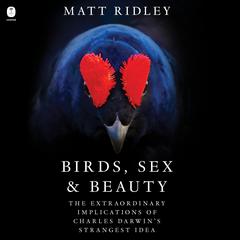 Play Audiobook Sample
Play Audiobook Sample
The Evolution of Everything: How New Ideas Emerge Audiobook
 Play Audiobook Sample
Play Audiobook Sample
Quick Stats About this Audiobook
Total Audiobook Chapters:
Longest Chapter Length:
Shortest Chapter Length:
Average Chapter Length:
Audiobooks by this Author:
Publisher Description
“Mr. Ridley’s best and most important work to date…there is something profoundly democratic and egalitarian—even anti-elitist—in this bottom-up approach: Everyone can have a role in bringing about change.” —Wall Street Journal
The New York Times bestselling author of The Rational Optimist and Genome returns with a fascinating argument for evolution that definitively dispels a dangerous, widespread myth: that we can command and control our world
Human society evolves. Change in technology, language, morality, and society is incremental, inexorable, gradual, and spontaneous. It follows a narrative, going from one stage to the next, and it largely happens by trial and error—a version of natural selection. Much of the human world is the result of human action but not of human design: it emerges from the interactions of millions, not from the plans of a few.
Drawing on fascinating evidence from science, economics, history, politics, and philosophy, Matt Ridley demolishes conventional assumptions that the great events and trends of our day are dictated by those on high. On the contrary, our most important achievements develop from the bottom up. The Industrial Revolution, cell phones, the rise of Asia, and the Internet were never planned; they happened. Languages emerged and evolved by a form of natural selection, as did common law. Torture, racism, slavery, and pedophilia—all once widely regarded as acceptable—are now seen as immoral despite the decline of religion in recent decades.
In this wide-ranging, erudite book, Ridley brilliantly makes the case for evolution, rather than design, as the force that has shaped much of our culture, our technology, our minds, and that even now is shaping our future.
Download and start listening now!
“Narrator Steven Crossley reads in a precise, cultured tone that conveys the scholarship behind Ridley’s expansive work…Crossley is called upon to provide accurate pronunciations of names and technical terms from a variety of fields as well as quotations in a variety of languages. He delivers on those challenges, and his calm, even voice provides a perfect medium for Ridley’s explanations of how new ideas evolve.”
— AudioFile
Quotes
-
“Mr. Ridley’s best and most important work to date…There is something profoundly democratic and egalitarian—even anti-elitist—in this bottom-up approach: Everyone can have a role in bringing about change.”
— Wall Street Journal -
“A fascinating work…The way the book frames the argument is delightfully novel…Ridley has amassed such a weight of fascinating evidence and anecdote that the pages fly by.”
— Times (London) -
“A highly intelligent and bracingly iconoclastic view of the world. It forces us to see life through new eyes.”
— New York Times Book Review -
“Exceptionally easy to read, easy to understand, easy to appreciate.”
— Washington Times -
“Highly readable, invariably interesting…Ridley’s laudable aim is to disenthrall us of our intuitive creationism and make us see evolution at work everywhere.”
— New Scientist -
“Fascinating essays backed by a mixture of good evidence and personal philosophy…Provides a wild ride, almost too thought-provoking to read for long stretches but difficult to put down.”
— Kirkus Reviews (starred review) -
“The reasoning is sound and arguments are well-supported with historical precedent and general observation…Ridley provides enough evidence to support his claims and generate no shortage of debate.”
— Publishers Weekly -
“Readers of evolutionary theory, sociology, history, anthropology, and philosophy shall be highly entertained by this thought-provoking read.”
— Library Journal -
“Building on the timeless insights of Lucretius, Ridley examines how civilization inexorably organizes itself. Wrong-headed social theories, he and Lucretius agree, just get in the way.”
— Stewart Brand, author, Whole Earth Discipline
Awards
-
A New York Times Editor’s Choice
-
A New York Times Bestseller
The Evolution of Everything Listener Reviews
- — Nick Chalmers, 2/15/2018
About Matt Ridley
Matt Ridley is an author whose books have sold over a million copies, been translated into thirty-one languages, and won several awards. He sat in the House of Lords from 2013 and 2021 and was founding chairman of the International Center for Life in Newcastle. He created the “Mind and Matter” column in the Wall Street Journal in 2010 and was a columnist for the London Times. He is a fellow of the Royal Society of Literature and of the Academy of Medical Sciences, and a foreign honorary member of the American Academy of Arts and Sciences.
About Steven Crossley
Steven Crossley, a graduate of the Royal Academy of Dramatic Art in London, has built a career on both sides of the Atlantic as an actor and audiobook narrator, for which he has won more than a dozen AudioFile Earphones Awards and been a nominee for the prestigious Audie Award. He is a member of the internationally renowned theater company Complicite and has appeared in numerous theater, television, film, and radio dramas.


























